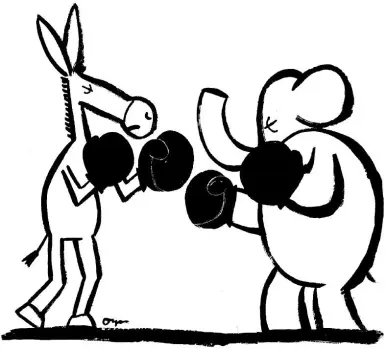By: Sulaiman Aruna Sesay
Sierra Leone, like many other African countries, has a long history of partisan politics. Political parties have always played a major role in the governance of this West African country since its independence in 1961.  The adverse effects of partisan politics on Sierra Leone’s national development have become increasingly evident in recent years. Thus, the need to stop partisan politics in Sierra Leone is an urgent issue that needs to be addressed.
The adverse effects of partisan politics on Sierra Leone’s national development have become increasingly evident in recent years. Thus, the need to stop partisan politics in Sierra Leone is an urgent issue that needs to be addressed.
One of the major reasons for the call to cease partisan politics in Sierra Leone is the divisiveness that it has created among its citizens. Political parties use their ideologies and beliefs as tools to gain power and influence, and this has resulted in the population being divided along political lines. As a result, people are more interested in supporting their political party rather than working collectively towards national development, regardless of which party is in power. To make sense out of this, let me draw your attention to where partisan politics all started. Tribal or ethno regional politics came into the public domain after the death of Margai. The All People’s Congress (APC) recruited people in the provinces that were formerly the seats of the SLPP. Siaka Stevens, leader of the APC, claimed that he was born of a Limba father and a Mende mother from Moyamba, the headquarter town of the Kayamba chiefdom in the south. This temporarily diffused any tribal tensions, since he appeared to be the son from the two divides – north and south/east. He focused his campaign and recruitment in the north of the country, where he recruited elite and educated people to join him by making false promises and effecting the character assassination of the then prime minister, Albert Margai.
Partisan politics has contributed immensely to the political violence and unrest that Sierra Leone has experienced. This has been evident in the 1990s during the Sierra Leone civil war, which claimed many lives and left the country in ruins. Even after the war, there have been many instances of political violence during election periods, with supporters of opposing political parties attacking one another. Therefore, stopping partisan politics in Sierra Leone would be a major step in promoting peace and harmony among the citizens.
Another reason why Sierra Leone needs to end partisan politics is that it hinders development. The constant political bickering and animosity between the ruling party and the opposition party create an unstable political environment, making it challenging to implement long-term development plans. Political parties are less likely to work together towards a common goal, which is the development of the country, as each party wants to credit for its achievements. This means that public policies and projects are often delayed, which ultimately results in negative effects on the country’s economic growth.
Political parties in Sierra Leone have been known to prioritize their interests ahead of the nation’s interests. They have been accused of corruption, nepotism, and favouritism in the distribution of national resources and public offices. The dominance of political parties in decision-making has allowed them to maintain this corrupt practice, which only benefits a few individuals in the party hierarchy while leaving the majority of the population in poverty.
Sierra Leone needs to stop partisan politics if it wants to achieve sustainable development and social cohesion. This calls for a more inclusive approach to national development, where all political parties work together towards achieving common goals. It is essential for Sierra Leoneans to understand that national issues require a collaborative and bipartisan approach rather than a partisan one. The sooner Sierra Leoneans abandon this divisive and destructive practice, the better it will be for the development of their country.












